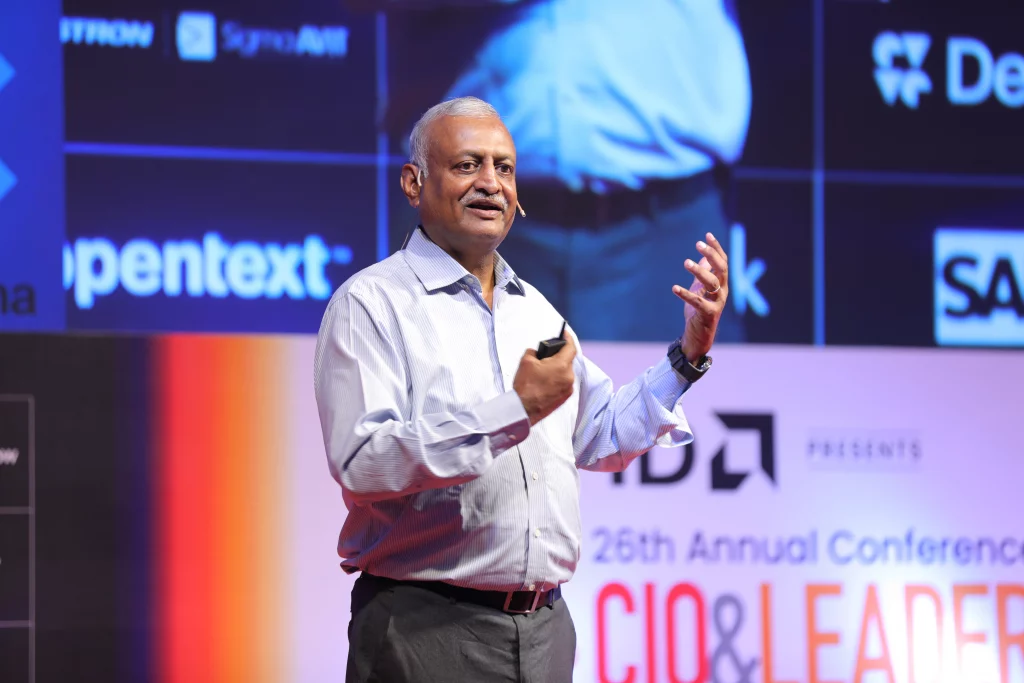Partha Iyengar, Consultant and Ex-Gartner Fellow, outlines a practical ‘AI Cookbook’ to guide enterprises from pilots to production.

“It’s not the strongest or the most intelligent that survive; it’s the ones most adaptable to change,” said Partha Iyengar, Consultant, Ex-Gartner Fellow, and former Country Manager of Research, invoking Darwin to frame the corporate challenge of artificial intelligence. In a keynote that was equal parts playbook and provocation, Iyengar outlined a “management cookbook” for AI adoption- a step-by-step recipe to move beyond hype, pilots, and isolated projects toward truly resilient, future-ready organizations.
The AI Foundation: Readiness Before Ambition
Iyengar argued that the first step in AI success is not strategy decks, but organizational readiness. Leaders, he cautioned, must be literate in AI, not at the “airline magazine syndrome” level of hype, but with a realistic grasp of risks and possibilities. Enterprises must also adopt a “try fast, fail fast” mindset, promote digital dexterity across business units, and align their cultures with startup-style agility.
“AI will amplify whatever you already are,” Iyengar warned. “If you’re not ready, you can make a good situation bad or a bad situation worse.”
From Pilots to Production: Avoiding the Traps of Scale
Too many companies, Iyengar said, get stuck in the “pilot purgatory.” His framework emphasizes selecting the proper use cases, which are big enough to test concepts but small enough to fail safely. He urged leaders to measure outcomes in hard business terms, not arcane technical metrics, and to avoid emotional attachment to pilots that don’t deliver.
Scaling, he explained, is not a single leap but a series of staged transitions, with HR, finance, and data governance integrated from the very beginning. “Don’t scale from a six-month pilot to a multi-year production. That’s too big a leap,” Iyengar stressed.
Data, Skills, and Governance: The Hard Realities
Calling data “the heart of AI success or failure,” Iyengar insisted on treating it as a corporate asset. Without clean, governed data, AI becomes “garbage in, garbage out.” He also flagged talent as a bottleneck: companies will need not only data scientists but also unusual roles, such as AI ethicists, psychologists, and legal professionals, embedded within the IT department.
Equally critical, Iyengar said, is dedicated AI governance. Enterprises must create clear escalation paths and even appoint AI champions on their boards. “AI cannot simply fold into your existing governance processes,” he warned. “The risk is too high.”
Change Management: The Achilles’ Heel of Indian Enterprises
In Iyengar’s view, change leadership is where most companies stumble. Leaders underestimate the human factor, assuming people will adapt automatically. Instead, organizations must clearly communicate “what’s in it for me” to employees and foster runners who are early adopters, driving peer pressure for adoption.
Small “culture hacks,” he argued, often achieve more than endless workshops. He cited a CEO who reduced wasted meeting time by personally walking into rooms and demanding clarity on value, thereby shifting the culture in just two weeks without a single PowerPoint presentation.
The Endgame: Building Future-Ready Organizations
Ultimately, Iyengar reminded the audience, AI success is not about projects but about transformation. Companies must evolve to adopt flatter structures, decentralized teams, and social leadership, a shift that is particularly vital in India, where younger Gen Z employees resist traditional command-and-control models.
He urged leaders to anticipate new roles, such as autonomous system trainers and AI integration specialists, while also preparing to present AI success stories to investors as part of the corporate narrative. “The endgame of AI,” he said, “is to create a resilient, future-ready enterprise; one where AI is part of the DNA, not an isolated initiative.”
A Recipe for Leaders, Not Just Technologists
Partha Iyengar’s “AI Cookbook” is less about coding algorithms and more about cooking up cultural change, governance discipline, and leadership agility. His closing words carried both urgency and optimism: “If you treat AI as just a series of projects, you’re doing it wrong. The real goal is to reimagine your organization for the future. May the AI force be with you.”